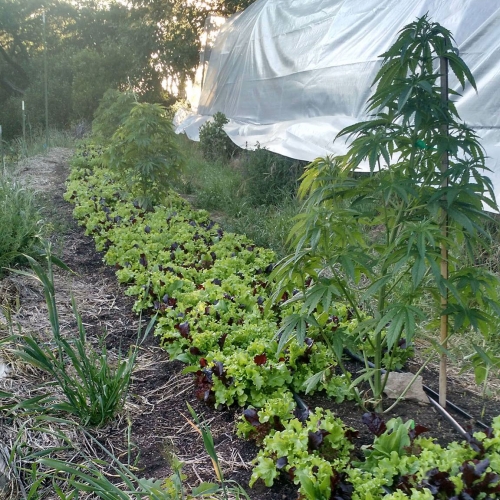From the Open-Publishing Calendar
From the Open-Publishing Newswire
Indybay Feature
Why Farmers Need Direct Sales
As a vegetable farmer, the scale at which I produce is not large enough to enable me to survive in the wholesale marketplace. The same is true for my cannabis crop.
Why Farmers Need Direct Sales
To Whom it May Concern,
As a vegetable farmer, the scale at which I produce is not large enough to enable me to survive in the wholesale marketplace. The same is true for my cannabis crop. Given the extensive and costly regulatory requirements, along with the falling wholesale price, it is of utmost importance that small cannabis farmers be able to access a direct-sales market option.
It’s the 80-20 principle; so long as my farm is able to engage in direct market participation with consumers for 20% of our product, we will then have workable margins to move the other 80% in a wholesale marketplace. If I tried to compete with Safeway, I’d go out of business; being able to access direct market channels as a market-gardener is crucial to my business strategy.
In a world dominated by large brands with extensive advertising budgets, it is necessary for small farms to be able to interact directly with their consumers to build brand awareness. Creating an understanding in the marketplace for what makes small farms different and worth supporting in the minds of consumers is paramount to our survival.
Without the opportunity to interact directly with consumers, small farms are at the mercy of larger downstream industry players, who are able to control consumer perception in ways that often do not include the realities of small farms.
Given the requirements for testing and quality assurance, along with the implementation of a Track and Trace system that will log transactions of product, it would be sensible to allow farmers to retrieve product from distribution hubs after testing and taxation have occurred. Farms should be allowed to have on-farm sales (when approved by local jurisdictions), and vending at events must be an option.
To disallow farms from participating in customer interactions is to remove one of the mainstays that have made us viable and competitive in the current marketplace. We are at a tremendous disadvantage to larger operations, but we are unique and important participants in our local economies. Changing the policy in regards to sales by small farms (so long as track and trace and distributor testing/taxation still occurs) is a logical and sensible policy.
Thank you for your time and I hope you will consider this.
Casey O’Neill, HappyDay Farms, Vice-Chair of Development for California Growers Association.
To Whom it May Concern,
As a vegetable farmer, the scale at which I produce is not large enough to enable me to survive in the wholesale marketplace. The same is true for my cannabis crop. Given the extensive and costly regulatory requirements, along with the falling wholesale price, it is of utmost importance that small cannabis farmers be able to access a direct-sales market option.
It’s the 80-20 principle; so long as my farm is able to engage in direct market participation with consumers for 20% of our product, we will then have workable margins to move the other 80% in a wholesale marketplace. If I tried to compete with Safeway, I’d go out of business; being able to access direct market channels as a market-gardener is crucial to my business strategy.
In a world dominated by large brands with extensive advertising budgets, it is necessary for small farms to be able to interact directly with their consumers to build brand awareness. Creating an understanding in the marketplace for what makes small farms different and worth supporting in the minds of consumers is paramount to our survival.
Without the opportunity to interact directly with consumers, small farms are at the mercy of larger downstream industry players, who are able to control consumer perception in ways that often do not include the realities of small farms.
Given the requirements for testing and quality assurance, along with the implementation of a Track and Trace system that will log transactions of product, it would be sensible to allow farmers to retrieve product from distribution hubs after testing and taxation have occurred. Farms should be allowed to have on-farm sales (when approved by local jurisdictions), and vending at events must be an option.
To disallow farms from participating in customer interactions is to remove one of the mainstays that have made us viable and competitive in the current marketplace. We are at a tremendous disadvantage to larger operations, but we are unique and important participants in our local economies. Changing the policy in regards to sales by small farms (so long as track and trace and distributor testing/taxation still occurs) is a logical and sensible policy.
Thank you for your time and I hope you will consider this.
Casey O’Neill, HappyDay Farms, Vice-Chair of Development for California Growers Association.
For more information:
https://www.facebook.com/casey.oneill.395/...
Add Your Comments
We are 100% volunteer and depend on your participation to sustain our efforts!
Get Involved
If you'd like to help with maintaining or developing the website, contact us.
Publish
Publish your stories and upcoming events on Indybay.
Topics
More
Search Indybay's Archives
Advanced Search
►
▼
IMC Network



